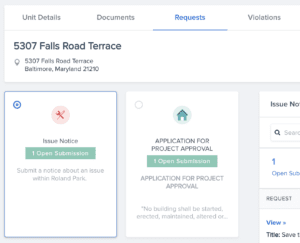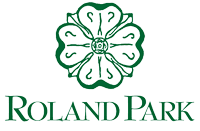General Standards for Changes to Exteriors of Roland Park Houses

Windows: Replacement windows should be of the same style as the originals. For example, if you are replacing casement windows, the replacements should also be casements. More energy efficient windows need not be incompatible with the aesthetics of the house. Double hung windows in Roland Park have a variety of interesting muntin patterns and better window manufacturers such as Pella, Loewen, Marvin, and others offer choices that will match the originals. Vinyl windows are not approvable because of their shiny appearance and difficulty in painting them. Wood or aluminum clad wood windows are the standard. The muntins in replacement windows should be “simulated divided lites” with spacer bars which, while not pieces of wood which individually divide each piece of glass, do give that appearance, rather than the one dimensional look of clip – in grills.
Roofs: For a tile or slate roof, the gold standard is to replace it with tile or slate. Original slate roofs are still on many houses; with regular maintenance, replacing slates and flashing as needed keeps them going strong. There are high quality architectural grade asphalt roof shingles which are acceptable alternatives and are approved on a case by case basis. If a joined home, materials must match the neighbor’s as nearly as possible.
Fences: The less obtrusive the better. Old fashioned hairpin wire fence works well and is easily hidden behind a hedge. Some of the newer black metal fences blend well into shrubbery, too. Picket fences are acceptable, and other types can be considered as long as they are not solid “privacy” fences. Any fence must be no more than 48 inches high and stay behind the front line of the house (i.e., back yard only). Ideally, fences should be camouflaged with shrubbery to maintain that park – like look. Fences must be installed “good” side to the public view.
Hardscaping: When approval is required by an individual covenant, an application (followed by approval) is necessary before installing any hardscaping, which refers to things outside incorporated into the landscaping, such as, but not limited to, patios, driveways, sidewalks, fire pits, walls, swimming pools, hot tubs, gazebos, playsets, parking pads, etc. Natural materials are approvable; most artificial products are not, but as these materials improve, consideration can be given on a case by case basis. Above ground swimming pools are not approvable. Hot tubs must be placed unobtrusively and screened by shrubbery. Playsets must be in rear yard, not visible from the street, with dark green canopy.
Siding/shingles: Original material is the gold standard; newer products are approvable under some circumstances where they are paintable and indistinguishable from the original. This is another case of newer materials coming along which prove to be acceptable alternatives.
Light fixtures: Exterior lighting must be approved. This includes lampposts, flood lights, landscape and path lights.
Machinery: The placement of residential machinery such as heat pumps, compressors, air conditioning systems and generators is subject to approval. They should be placed so as to minimize interference with neighboring property, both in terms of sight and noise
Solar panels and satellite dishes: Locations must be approved. They shall not be mounted on the front of a house and shall not be visible from the street.
Doors: Wooden is the standard. Metal doors are not approvable, not only because of appearance, but also because they are not necessarily more secure. The door frame and installation are key components of door performance.
Paint: Although there is not a list of specific paint colors that are approvable, colors should be compatible with the period and what was traditionally used on homes in Roland Park. Creosote applied to cedar shakes produced the dark brown houses once universal on shingle houses in the neighborhood. Many people today prefer other colors. Soft, neutral shades are generally approved for houses, whether clapboard, cedar shake, or stucco. “Painted ladies” were not a style seen in Roland Park.
Garages & outbuildings: Baltimore City permits garages in back yards only and are considered on a case by case basis. Garage doors for the bays (i.e., where the cars come in) can be metal, but are discouraged, since there are such attractive new wooden garage door styles. Metal is not acceptable for the personnel door (i.e., where only people fit). Outbuildings other than garages have been discouraged, but for houses without garages, property owners have a reasonable need for storage of lawnmowers and other landscape equipment. Any shed type building must be as unobtrusive as possible in location and be screened by shrubbery. Shed applications are considered on a case by case basis. Prefabricated sheds are not permitted.
General Covenant Guide
Timeline: All projects must commence within one year of the date of approval or be resubmitted.
Application for Project Approval is now through PayHOA
- Login to PayHOA. The initial “Dashboard” screen should show the “Unit Details” tab as shown below.

- Click on the “Requests” tab as shown below.

- Within the “Application for Project Approval” panel, click on the “+ New Submission” button shown below (within the “Requests” tab shown above).

- Attachments can only be added after saving your submission. Each application is a working document, content can be added over time as needed throughout the review process.






